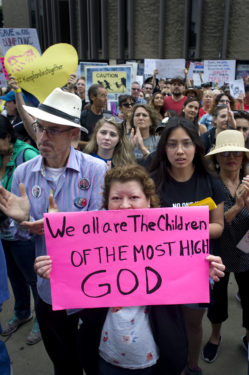By Father Patrick Keating

President Donald Trump ended the administration’s policy of taking children from their parents at the southern border last week. But the humanitarian crisis he created by enacting this policy is far from over.
At the start of this week, the Trump administration said more than 2,000 of the approximately 2,300 children separated from their families, had not been reunited. It remains unclear how and when the separated children, including babies and toddlers, will be reunited with their mothers and fathers. With each day that passes, these children are enduring mounting psychological trauma.
While the administration is no longer actively separating families who cross the border without permission, a new policy to indefinitely detain children and parents together has now been enacted. This policy could still lead to family separation, because of a previous court ruling, which limits the detention of children to 20 days. It is important that we understand (1) the effect of the current policy on children (2) what we as Catholics can do and (3) the law regarding asylum seekers.
There is a false narrative painting asylum seekers as lawbreakers. The act of requesting asylum is not a crime. An asylum seeker is a person who has moved across an international border in search of protection under the 1951 United Nations Refugee Convention, but whose claim for refugee status has not yet been determined.
To qualify for protection under this convention, which was adopted by the United States, a person must reside outside his or her country or nationality and be unable or unwilling to return on account of a well-founded fear of persecution. This fear of persecution has to be based upon race, religion, nationality, membership in a political social group, or political opinion. Under U.S. law, any alien who is physically present in the United States or who arrives in the United States, irrespective of such alien’s status, may apply for asylum.
Effect of Trauma
While allowing babies, toddlers, and children to stay with their parents may lessen the trauma, detaining them together still causes harm. The American Academy of Pediatrics (AAP) has found that prolonged detention of children can cause psychological and emotional damage, leading to learning disabilities and lifelong insecurities.
Rather than implementing family detention, which could be struck down because it violates a previous court settlement, the administration should place families in alternative programs, which have been proven to be less expensive and more humane. These programs manage family cases, help immigrants with basic social services, and provide legal representation, until the asylum court hearing.
The Family Case Management Program, started late in the Obama administration, was ended by the Trump administration in 2017. In the short time it was implemented, the pilot program assisted nearly 700 families. The families were not detained, yet 99 percent of them appeared for court hearings. Because detention was unnecessary, the program was much cheaper, costing taxpayers $36 a day per person, compared to $278 a day per person held in detention facilities.
The program also made the court system more efficient, as asylum-seekers were more likely to obtain lawyers who could help expedite the legal process. The current administration should be implementing programs like this one, instead of creating crisis and adding chaos to a long broken immigration system.
What else should our government be doing to respond to this humanitarian crisis? In the short-term, our officials should end the zero tolerance policy, which is costly and will not deter Central American families from fleeing violence in their homelands. As more than 75 former U.S. attorneys wrote to Attorney General Jeff Sessions, prosecutors should be given discretion to prosecute border crossers who are truly a threat to our country, not be forced to jail asylum-seekers looking for safe haven.
Over the long-term, the United States should help these Central American countries address the push factors of gang violence, political corruption and endemic poverty. This is the most humane and long-lasting solution to this crisis, as families that feel safe and feel like they have a future, will remain in their homelands.
Human Rights Issue
As Catholics, we should collectively push for human rights-based policies, not deterrence policies, to address this humanitarian crisis in our hemisphere. Catholic agencies and dioceses, such as Catholic Relief Services in the region and local Catholic Charities on the border, are doing what they can to ease the human suffering, but structural changes are needed to end it altogether.
What can Catholics do to help the situation? First, you should contact your Senators and Representatives and ask them to oppose family detention and to support comprehensive immigration reform based on the principles of the U.S. Catholic bishops. Second, the power of prayer can make a difference in helping these families and their homelands.
The American public and Catholics in our diocese and across the nation, have said no to the separation of families at our border. We should also say no to family detention and voice support for humane policies that reflect our Catholic and American values.
Very Reverend Patrick J. Keating, Esq., is the CEO of Catholic Migration Services and Deput CEO of Catholic Charities Brooklyn and Queens.
